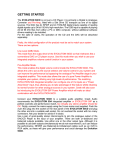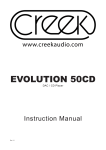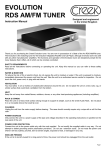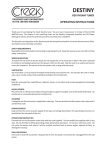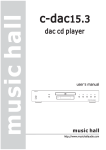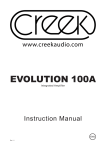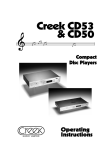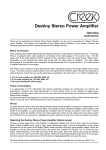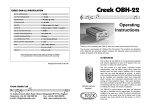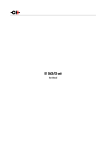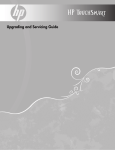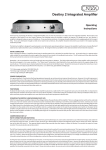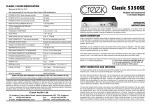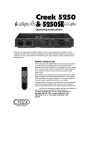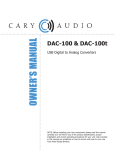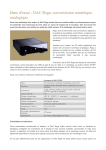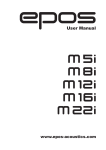Download EVOLUTION 50CD
Transcript
EVOLUTION 50CD DAC / CD Player Instruction Manual Rev 1.0 Congratulations on purchasing a Creek EVOLUTION 50CD. Please read this manual thoroughly as it will explain in detail the features and operation of your EVOLUTION 50CD and help to ensure a trouble free installation. Unpack the player carefully, as it is recommended that you save the carton and packing material for future use, should you need to move home or return it for service etc. SAFETY INFORMATION The EVOLUTION 50CD is designed to operate on either 220-240 Volts - 50 Hz AC, or 110120 Volts - 60 Hz AC. The voltage selector switch is located on the bottom of the case; to select a different voltage range, use a small flat-blade screwdriver to push the switch from one position to the other. A mains fuse is fitted to a sliding tray inside the IEC socket. There is a spare one also fitted inside and they are designed to work in both voltage ranges. If the mains fuse fails and the spare fails also when fitted, it usually indicates a serious internal fault and the product should be returned to the dealer or a specialised service company for inspection and or repair. Do not attempt to effect repairs yourself. The product has been tested and found to comply with the limits for a Class B digital device, pursuant to Part 15 of the FCC Rules. These limits are designed to provide reasonable protection against harmful interference in residential installations. TO ACHIEVE MAXIMUM PERFORMANCE FROM YOUR EVOLUTION 50CD: Install the equipment in a location which is relatively free of moisture and dust, and is well ventilated. The equipment may not be able to perform at its best in an extremely cold or hot environment. Do not attempt to use below 5 C / 41 F or above 35 C / 95 F. Always handle compact discs with clean hands. Avoid using scratched discs. Do not attempt to clean the CD player or discs with chemical solvents, as this may cause irreparable damage. Use a clean, dry cloth, or specially designed cleaning materials for discs. If the CD player malfunctions, do not open the unit and attempt to repair it yourself. This is a highly technical product and requires specialist service – please return it to your dealer. Use two batteries (2 x AA) of the same type in the remote control handset. Do not use odd or different type cells as it may affect the performance. Keep this manual in a safe place for future reference. Page: 1 GETTING STARTED The EVOLUTION 50CD is not just a CD Player; it is primarily a Digital to Analogue Converter, fitted with a Slot Drive CD transport as one of its digital sources. The DAC has 2x SPDIF and 2x TOSLINK digital inputs capable of reading digital signals up to 24 bit 192 kHz high-resolution. The USB input is capable of playing 24 bit 96 kHz files from either a PC or MAC computer, without additional software drivers needing to be installed. For the sake of clarity, the operation of the CD and the DAC will be described separately. Connect your EVOLUTION 50CD to a suitable audio amplifier. Creek Audio recommends the EVOLUTION 50A integrated amplifier as a perfect cosmetic and performance match, but virtually any stereo amplifier with a line-level input and volume control should be OK. Firstly, connect the mains supply using the 3-core mains cord supplied. Push the 3 pin IEC plug into the socket on the rear panel of the EVOLUTION 50CD and plug the other end into a suitable wall socket. Do not overload the socket with too many connectors. Ask your dealer for advice if in doubt. Use a pair of good-quality stereo interconnects to join the analogue output of the DAC/CD Player to the input of your amplifier. There are both un-balanced and balanced outputs available. Use either one or the other output type. Although it is possible to use both outputs simultaneously we do not recommend it, as it can reduce the performance. NEVER use Balanced-to-Unbalanced cables such as an XLR to RCA cable, as these will give poor performance and could damage the Evolution 50CD. Note: Balanced outputs can be connected directly to the EVOLUTION 50A amplifier and if the distance between them is greater than 5 metres, this may provide a better quality of sound. Balanced audio, using XLRs is a professional standard and designed to eliminate unwanted noise or hum over long cable lengths. For shorter cable runs it may not improve the sound of your system, so please experiment to see what works best. Just as with un-balanced interconnects, cable quality can affect the sound quality. Ask your dealer for advice if you are not sure. Page: 2 REAR PANEL The rear panel contains all the input and output connections. INPUTS 1. USB input, is for connection to a computer to extract the highest quality digital audio data possible. 2. Co-ax SPDIF digital input, which can connect to a CD transport, or other digital device. 3. Optical TOSLINK digital input, which can connect to a CD transport, or other digital device. 4. Co-ax SPDIF digital input, which can connect to a CD transport, or other digital device. 5. Optical TOSLINK digital input, which can connect to a CD transport, or other digital device. 6. An optional, plug-in, Bluetooth module may be made available in future. Please check with your dealer or on the Creek Audio website for price and availability. OUTPUTS 1 x Co-ax digital output, is for passing digital signals through the EVOLUTION 50CD. 1x Optical digital output 2 x RCA un-balanced audio outputs, Left and Right. 2x XLR balanced audio outputs, Left and Right. 1x Mains input - 3 pin IEC with ground connection and fuse. Use the power cord supplied, which is suitable for use in your country or region. RC Bus connecting the out to a matching EVOLUTION 50A amplifier allows one to control both products with the use of one IR sensor. Using the appropriate accessory from Creek, it also allows the product to be installed in a hidden location and still operated by using an optional extension IR receiver. Consult your dealer or www.creekaudio.com for price and availability. Page: 3 FRONT PANEL CONTROLS DISP POWER The mains On/Off switch is a button located on the right hand side of the front panel with the engraved power symbol above it. Press this button to power the EVOLUTION 50CD on or off. Please note that the EVOLUTION 50CD does not have a Standby power function. CD OPERATON There is a group of 5 buttons next to the slot for CD operation, plus a Repeat button in the group of 4 buttons right of the display. Listing buttons in a clockwise order: PLAY/PAUSE Press the Play button once to play the first track. Press once again to Pause while playing. Press Play to start playing the disc. If available, CD text will scroll across the top of the display, indicating among other things possible, the artist, album and track name. STOP Press the Stop button to end play. LOADING/EJECTING A DISC To load a disc, simply post one through the slot aperture on the left hand side of the front panel, with the label facing upwards, being careful not to put finger prints or dirt etc. on the playing surface. The mechanism will sense the proximity of the disc after it is half way in. It will then automatically draw the disc inside completely and read its Table of Contents (TOC), which will be displayed. It will then be in the Stop position. EJECT To remove a disc, press the Eject button to force the disc out of the slot drive. Pressing Eject while the disc is playing will not harm the disc. SKIP FORWARD/SCAN FORWARD Press once to Skip-forward through the tracks. Press and hold to Scan-forward through the currently track. SKIP BACKWARDS/SCAN BACKWARDS Press once to Skip-back to the start of the track and again to Skip-back to the previous track, or tracks. Press and hold to Scan backwards through the track currently playing. REPEAT Press this button to toggle the Repeat function between single tracks, a whole CD, or off. Holding this button down longer will enable the Random play function on/off. Page: 4 Display features: With a disc loaded, the display will indicate the total number of tracks and total playing time when in STOP mode. During playback, the track number and track time will also be displayed. Symbols are also shown for Repeat and Random functions. If the disc contains CD text data, this will also be shown across the top of the display and will scroll when the disc is playing showing Artist, Album name and Track name. INFO Pressing INFO will allow CD time to be toggled between elapsed and remaining track time. A long press will enable or disable CD text. DAC AND CD OPERATION SRC. This button is short for Source. Press it to toggle through the various inputs available, from CD only, Input 1 = USB, Input 2 = Co-Ax, Input 3 = Optical, Input 4 = Co-Ax, Input 5 = Optical. Optional BT input will follow. MENU Pressing the MENU button will reveal a selection of options that affect the way the product operates. These should be set to taste and the option tree looks like this: Display settings Always on Display is always on Auto off Display goes off after a short time. Selecting any function will cause the display to light again for a few seconds. Display Brightness Low - Med - Full Using the front panel CD buttons will enable these functions. Play = Enter, Stop = Exit, Previous and Next moves the cursor up and down. Page: 5 REMOTE CONTROL OPERATION Press CD button first: SELECT A SPECIFIC TRACK Press the track numbers at the top, 0 - 9. The number will appear in the display and the track will begin to play after a short delay. RANDOM will select random track playback. INFO toggles the display between elapsed and remaining time. A long press will enable or disable CD text. REPEAT causes the current track or the whole disc to be repeated. Press the REPEAT button once and the current track will be repeated. Press REPEAT a second time and the entire disc will be repeated. Press the REPEAT button a third time and the player will revert to normal play. DIM adjusts the display brightness. FILTER offers 5 optional digital filter shapes. see further FILTER description below FUNCTIONS NOT YET IN USE: PROGRAM is not enabled yet. Look for future software updates from Creek to see if this little used feature has been written. VOLUME may be enabled in future. Look for future software updates from Creek to enable this function. Press the DAC button first and use the blue volume up down button to adjust. PHASE cannot be enabled for the EVOLUTION 50 CD, which uses a double differential DAC circuit. It is for other Creek DACs such as the RUBY. Page: 6 DAC OPERATION Press DAC button first. The DAC will operate like a digital pre-amp, allowing you to select a different input for various digital sources. Some digital devices output their signal optically, so use a good quality TOSLINK cable to pass the signal to the DAC. Some products use only co-axial connections. Use a dedicated ‘digital interconnect’ for the best results. Ask your dealer for advice. The EVOLUTION 50CD can supports digital input signals from 16 to 24 Bit word lengths and sample rates from 32 kHz to 192 kHz. The incoming signal will be checked and the sample rate will automatically be displayed. All digital signals will be output via the co-ax or optical connectors, to allow another device to receive the same signal. USB input, allows the DAC to behave like a sound card. Your computer will recognise the USB DAC and should have no problem linking to it automatically. Once the link is established audio data can be transferred and converted at the highest quality. The remote control will allow limited control of the incoming signal, such as play, pause, stop etc. However, if a media player such as iTunes is used, it is much more convenient to control files using the (remote) App to view and control your library via a tablet computer, smart phone or other remote device. The USB input is totally galvanically isolated to prevent any computer generated electrical noise from interfering with its performance. DIGITAL FILTERS Toggling the FILTER button on the remote handset selects five available digital filter options. These are used by the DAC to reconstruct the analogue waveform from the digital signal provided by the source. The five filters offer differing compromises between performance and suppression of ultrasonic noise. The best option will be system dependant so try experimenting to see which option you prefer. The differences are very subtle so it may take some time to find your favourite! None of the filters significantly affect the frequency response in the critical 20Hz – 20kHz audible range so don’t be worried about having the “wrong” selection; there is no right or wrong option. Page: 7 Technical Specifications: Digital inputs 2 x SPDIF, 24 Bit 192 kHz, via RCA sockets, transformer isolated 2 x TOSLINK, 24 Bit 192 kHz, optically isolated 1 x USB class 1.0 Audio, 24 Bit 96 kHz asynchronous, galvanically isolated. No additional software drivers are needed to support 96 kHz with either MAC or PC, but several choices are available to obtain bit perfect performance. Optional input An upgrade slot is provided on the DAC PCB internally, for an addition Blue- tooth input, plus a hole on the rear panel to attach an antenna. A separate user manual for the BT option will be provided for installation. Ask your dealer or Creek Audio for more information about fitting this option. CD transport Custom designed, ICE quality, CD slot-loader, externally clocked for bit perfect performance. Signal to Noise ratio > 115 dBA THD typ. 0.001% @ 1kHz 0dBFS Frequancy Response +/-0.1dB 20Hz-20kHz at 48kHz+ Channel Separation >95dB 20Hz-20kHz, typ. 110dB @ 1kHz Digital output 1 x SPDIF and 1 x Toslink optical output, pass-on all input signals Digital filter 5 digital filters are selectable via the remote Audio output 2 x RCA un-balanced, 2.0V. 2 x XLR balanced output, 4.0V Audio buffering High grade FET Op-amp audio buffering and filtering. Output impedance 47 Ohms unbalanced and 94 Ohms balanced Power supply 25 Watt toroidal mains transformer RC Bus Input/output connection for external IR remote and serial link to EVO 50A DAC type 2 x Wolfson WM8742, 24 Bit 192 kHz, in double differential configuration Input receiver WM8805, multichannel digital input receiver USB type Class 1 Audio (24Bit 96kHz) galvanically isolated and on a separate PCB for potential future upgradability Operating Voltages 100 - 120V/ 200 - 240V, Switchable Consumption 6W idle, 10W During CD Playback Weight 5.5Kgs (12.12 lbs) Dimensions W/H/D 430 x 60 x 280mm Finish Silver or black engraved front panels (16.9 x 2.36 x 11 inches) Creek Audio Ltd reserves the right to change or modify the specification of its products without prior warning. Page: 8 WARRANTY If within two years of purchase date your Creek EVOLUTION 50 proves to be defective for any reason other than accident, misuse, neglect, unauthorized modification, or fair wear and tear, Creek Audio Ltd. will, at its discretion, replace the faulty parts without charge for labour or return carriage within the United Kingdom. For warranty outside the UK, please consult your dealer or the importer. Worldwide distributor’s details are shown on the Creek website. This warranty is valid only in the United Kingdom and given in addition to statutory rights. Service enquiries outside the United Kingdom should be addressed first to the supplying dealer and/or the Creek distributor/importer. Warranties granted in these countries are entirely at the discretion of the distributor/importer. Warranties granted in countries other than the UK are entirely at the discretion of the distributor/importer. Page: 9 Creek Audio Ltd 12 Avebury Court, Mark Road, Hemel Hempstead, Hertfordshire, HP2 7TA England www.creekaudio.com - [email protected] - +44(0)1442 260146












